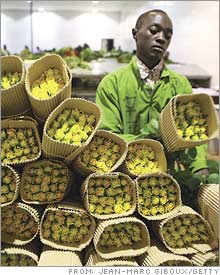|
Africans feeding Americans It sounds like a whopper of a fish tale - but Africa is developing a vibrant export-based commercial farming industry.
(Business 2.0 Magazine) -- Clement Kagwa, hands gloved in thick rubber, expertly wields his 7-inch knife, slicing into a fleshy 3-foot-long perch caught by fishermen only hours before. He cuts off one fillet, decapitates the fish, then carves out a second fillet. He flicks the fish's head into a bin below his cutting table, then places the gleaming pink fillets onto a conveyor belt. Time elapsed: 52 seconds. Kagwa works in a fish-processing plant owned and managed by a Belgian living in the East African country of Uganda. The fish, tasty Nile perch, come from Lake Victoria, only a few miles away.
The hundreds of fillets Kagwa and his co-workers carve out on this recent workday will be chilled to near-freezing temperatures and flown - on two long British Airways passenger flights to San Francisco. Two days after they leave the plant, the fillets are to be eaten by Americans 8,000 miles from where Kagwa works. Africans feeding Americans - it sounds like one whopper of a fish tale. Africa remains a continent of episodic starvation and chronic food shortages; tens of millions of sub-Saharan Africans are unable to reliably and consistently feed themselves. This is an excerpt from "Africa in Bloom," which appears in Business 2.0's September issue. But as implausible as it might seem, these imbalances coexist with pockets of increasingly vibrant commercial farming throughout much of the continent. "Africans are starting to prove that not only can they feed themselves, but they'll help feed the rest of the world too," says Ken Stalder, president of SW Africa Holdings, of Rockville, Md., which ships lobster tails from Mozambique to Florida and the Northeast. Uganda is still best known to most people for the mad dictator and self-proclaimed cannibal Idi Amin, who savaged the country in the 1970s - is ground zero for a startling transformation of African agribusiness that's spawning scores of entrepreneurial opportunities. The country boasts two growing seasons, ample rain, rich volcanic soils, and millions of small farmers eager to expand production of cash crops. Output of everything from fish to rice, vanilla to sunflower seeds, roses to potatoes is soaring. Overall, Ugandan farm output increased nearly 50 percent during the past decade. Investors and agriculture experts from the world over are flocking to Uganda, seeking ways to ride the emerging boom in African agribusiness. Israelis are building greenhouses and setting up the latest in hydroponic irrigation systems. Indians are growing rice and sunflower seeds. South Africans and Americans have invested in cotton gins. Europeans have opened fish-processing plants. Chinese traders are buying up specialty woods, leather hides, and fish innards - a delicacy not relished by most Westerners but big in Asia. Scouring Uganda for other food sources, Chinese officials are talking about buying a million tons of soybeans a year from Uganda and an equally gargantuan amount of cassava, a tuber the Chinese fry up and gobble the way Westerners devour french fries. Western investment in Africa has a sad history of promising starts with heartbreaking finishes, and many things - corruption, coups, climate change - could kill efforts to create a global breadbasket on the continent. Uganda, calm and increasingly advanced by African standards, is plagued by guerrillas on its northern frontier and is entangled in the Congo's horrific civil war. But for now, at least, the continent is dotted with fertile entrepreneurial fields and many ways to make hay. "I've been telling Americans, 'Come to East Africa; there are tremendous opportunities here,'" says Calvin Burgess, a real estate developer from Oklahoma City. He is launching rice- and fish-farming enterprises in western Kenya, across the border from one of Uganda's most fertile areas, where he hopes to expand. "Americans are crazy if we don't come," he says. "Opportunities like this around the world are rare indeed." Uganda's unfolding agricultural boom is, like much in the world economy today, partly fed by the roaring growth of China and India. Just as those countries are prospecting across the globe for fuel to power their superheated economies, they must also search abroad for foodstuffs to meet their surging middle classes' hunger for a more varied and richer diet. The boom is also fueled by Europe's emerging taste for year-round and exotic fresh foods and by increases in the wholesale prices of specialty items that make it economical to fly certain goods halfway around the world on commercial airlines so American consumers can enjoy Africa's bounty just days after harvest. G. Pascal Zachary is a former editor-at-large at Business 2.0. This is an excerpt from "Africa in Bloom," which appears in Business 2.0's September issue. |
|

